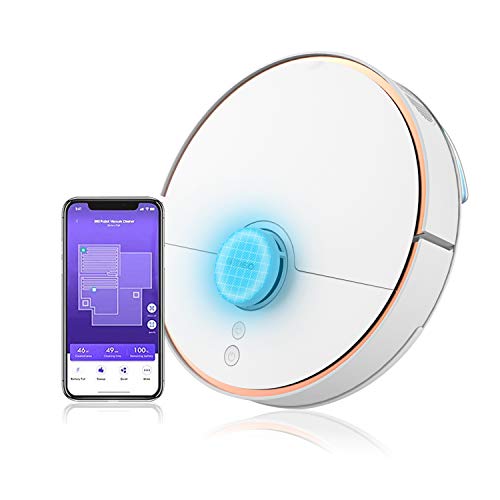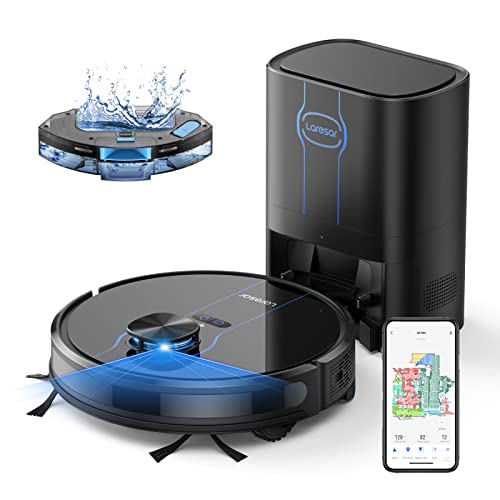20 Trailblazers Lead The Way In Robot Vacuum And Mops
페이지 정보
작성자 Candra 댓글 0건 조회 60회 작성일 24-09-04 06:24본문
 cheap robot vacuum Vacuum and Mop - Hands-Free Cleaning Made Easy
cheap robot vacuum Vacuum and Mop - Hands-Free Cleaning Made EasyIf you're interested in a cleaner that doesn't require hands to perform all of the tasks, think about this robot that is two-in-one. It can clean medium and low-pile carpets on floors and also allows you to create no-mop areas, and change cleaning schedules and modes of operation.
Look for models that sense what type of flooring they're using, take out their own water and dirt tanks and avoid obstacles like phone chargers, socks and pet hair. Also, learn how easy it is to install.
Self-Emptying
People are always looking for ways to reducing their workload as the world gets more chaotic and chaotic. Robot vacuums and mop swabs are among the most effective tools available to help with that. These machines can vacuum dirt, pet hair and crumbs while simultaneously cleaning the floors. You can make use of your smartphone and voice assistants to control these machines by using pre-programmed routines as well as specific room designations.
Self-emptying models are a great time saver for both the user and the. It's not necessary to empty the trash bin each time you clean. This will help you save time and let your robot clean your entire house more often.
If you're considering a model that self-empties make sure you check the size of the dustbin because it could quickly overflow if regularly used. You should also ensure that the system doesn't overfill, causing a clog that will prevent the robot from emptying it fully.
The self-emptying feature involves removing the dustbin from the machine and putting it in a larger storage container. Imagine it as a bag on a vacuum cleaner. It is able to be empty every two or three cycles. These robots are worth the extra expense because they come with this feature that is top-of-the-line.
Some models wash and dry the dirty pads automatically after every use. Others have a dock that does the work for you, and you only have empty it once or twice per year.
If you're looking for a single-function robot that does both look into this top-rated model from Roborock. The RockDock S7 MaxV Ultra is a mop and vacuum that comes with a dock that takes care of all maintenance. It's not necessary to empty the tanks manually and you can also schedule the unit to start by using the controls on your device and voice assistants such as Alexa and Google Assistant. It even has boundaries that keep it out of specific areas, if you don't want it roaming throughout your home.
Object Avoidance
The top robot vacuums feature the ability to avoid objects. This makes it easier for the device to navigate around furniture legs and other toys. This is a must-have for busy households with kids and pets, as when the robot comes into contact with these items they'll likely cause damage or even break the device.
The system is usually based on a single or pair of sensors located near the vacuum's shock-absorbing bumpers. Once the sensors detect an obstacle, the robot will automatically turn and reorient itself until it can find a path that is clear. Certain models utilize lidar technology, which makes use of lasers for measuring the distance between the robots and other objects. This allows the robot to create a live map of its surroundings and allows it to move around your living space with greater effectiveness.
Other robovacs which don't employ lidar technology are designed to use monocular or binocular vision to recognize obstacles with cameras. These systems are most efficient in bright lighting, but they do not perform as well in low-light conditions or with objects that are the same hue as the surroundings. For instance, a robot with monocular vision may have difficulty seeing shoes or cables.
Some of the most advanced robot vacs be more than just avoiding obstacles, which is why they're also referred to as smart vacs. They can build a virtual map of your home's layout, and let you send them to specific areas or rooms using the app. They will even remember where they've already cleaned. This will cut down on the time spent cleaning and ensure that your home is well cleaned.
Many of the most modern robotic vacuums and mops switch between different types of flooring. Some robot vacuums and mops automatically recognize the type of flooring in a specific room and adjust suction and brush functions in accordance with. Some even allow switching from carpet to hard flooring without losing suction power.
All smart vacuums and mop must feature some type of obstacle avoidance, irrespective of the flooring type. These features prevent the vacuums from getting stuck in a web or wires, which could cause them to lose suction. Certain models have a list of objects they are aware of for example, shoes, socks and pet waste. The best affordable robot mop models can identify these objects and calculate their size, distance and avoid them without running into it.
Floor Mapping
Most robot vacuums are equipped with sensors that detect objects. If something, like furniture legs or a toy being thrown in a random fashion or gets in the the vacuum's path, the sensor will signal it to steer away and then move to clean the floor. However the sensors aren't completely reliable. The Roomba 900 Series, for instance, was able to avoid our shoeslaces and headphones, but it accidentally sucked into a cable. We advise removing any objects from the robot's path before running it through your home's rooms.
A lot of the mopping and vacuum robots we have tested in The Spruce include an app. It can be used to save maps, create schedules, select cleaning modes and track your robot's performance. The best apps offer features that will make your robot more efficient. They are user-friendly and easy to use.
App integration also lets you keep the track of your robot's water tank as well as dirty pads. Find models that allow you to see how full the tank is and how much the pad is wet and when it's time to change the pad. You can even program a schedule to will automatically change the pad when it's wet in order to keep mildewy smells out of getting into the old pad.
The mapping feature is important for robot vacuums that work across multiple floors. It allows the robot to create an image of your house that it can use to move between rooms and clean various areas more thoroughly. Certain robots make use of sensors and artificial intelligence to create these maps. For instance, iRobot's Vacuuming Mapping utilizes multiple sensors to scan a space, including walls and corner to determine how far the robot can travel before hitting furniture or bumping into obstacles.
Other robots, such as the Ecovacs Deebot X1 -OMNI or the Roborock S7 MaxV Ultra use optical sensors to determine the wall's position. They can then follow the edges of furniture or use a mapping algorithm to design the best robot vacuum cleaner mop route for each room.
Mopping Settings
Robot vacuums are automated and all you need to do is to press a button in the app or on the remote control to allow them to clean up a space. You can also use voice commands to create schedules, which is a handy feature for busy families that require their robot vacuum to perform its duties all at the same time each day.
 Most robot mops have microfibre pads that are moistened using water tanks in their base, and many are able to be used repeatedly before needing to wash or replace the pad. Models that can adjust the flow of water to fit different floors are the Best robot vacuum for vinyl plank floors. Also, you should take into consideration the dimensions of the tank, whether you can switch the cleaning mode between wet and dry mopping and how long a robot mop can last on one charge.
Most robot mops have microfibre pads that are moistened using water tanks in their base, and many are able to be used repeatedly before needing to wash or replace the pad. Models that can adjust the flow of water to fit different floors are the Best robot vacuum for vinyl plank floors. Also, you should take into consideration the dimensions of the tank, whether you can switch the cleaning mode between wet and dry mopping and how long a robot mop can last on one charge.The most effective robot mop mops are able to effectively and quickly clean floors, even under tables and around obstacles. Although they're not perfect, they may struggle to climb stairs or maneuvering ledges between rooms. They can leave streaks on timber or tiles, particularly in sunlight.
A high-quality robot vacuum and mop must also have sensors that detect and avoid carpet. This is crucial when you live in a home with a mix of floor types because the robot will not be able to get caught in or over carpets. It must also be able to find other objects that could interfere with the cleaning process, such as cords or tassels, and allow you to create zones of no-go that block the robot from entering those areas.
The majority of the robots we test in our CHOICE lab have smart app integrations, which lets you save your home's map, set cleaning schedules and select cleaning modes. You can also set up virtual barriers to prevent your robot from certain areas, and receive (sometimes amusing) warnings about errors when the device has issues. Certain apps are more user-friendly than others, and a few have a webcam that allows live monitoring of your robot.
댓글목록
등록된 댓글이 없습니다.